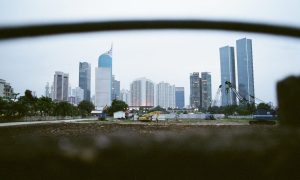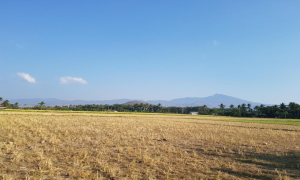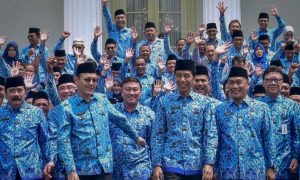About a month ago, Indonesian Finance Minister Sri Mulyani Indrawati shared a detailed proposal for a five-year development plan. The government’s proposed agenda hinges on human resources development as the key to achieving rapid economic growth. Between 2030–45, up to 64% of Indonesia’s estimated 297 million citizens will be of working age (15–64 years old). To capitalise on this opportunity, the Indonesian government is focussing on two key areas: education, and transitioning to a service-based workforce.
The preoccupation with human resources development is clearly reflected in the Minister of Finance’s high investment in the education and research sector. Through the Indonesian Endowment Fund of Education (LPDP), the government has allocated 46 trillion rupiah to improving the standard of both higher-education graduates and research. There are currently approximately 20,255 LPDP scholarship awardees around the world, and the government will open opportunities for another 5,000 new awardees this year.
In addition, the government will provide a college endowment fund to increase the quality of Indonesian universities. The aim is to support universities in working towards world-class standards, which will enable higher levels of human capital development in Indonesia. In total, almost 506 trillion rupiah from the state budget will be allocated to the education fund.
Meanwhile, the goal of shifting the locus of employment from manufacturing to the service sector is clearly reflected in the government’s enthusiasm for the rapid growth of start-up companies. Despite ongoing criticisms about the perpetuation of unstable work, several start-ups have become the saviour of Indonesian unemployment, empowering informal economy sectors and assisting middle-class growth.
Gojek alone has successfully empowered 1.7 million driver-partners, 125,000 merchants and 30,000 other services across 50 Indonesian cities. This number will likely increase as it expands under new billion-dollar investments. Meanwhile, online marketplaces, such as Tokopedia, Shopee and Bukalapak have improved the productivity of small-to-medium size enterprises. Tokopedia alone has partnered with more than 200,000 merchants.
Institutional challenges
Bureaucratic obstacles are commonly identified as one of the most frustrating barriers to achieving development. The basic question is: what kind of institutional arrangements would maximise the efficient mobilisation, distribution and management of capital investment aimed at human resources development?
President Joko Widodo has been working on this issue since his first day in office. His first term prioritised deregulation and de-bureaucratisation, especially regarding investment. During the first two years of Jokowi’s administration, the government claimed to have simplified 214 regulations and streamlined the process of issuing investment permits to take only three hours. One notable case of these efforts has been the push to release operation permits for motorcycle ride-hailing companies. While Indonesian transportation law continues to lack explicit regulations for motorcycle taxi drivers, the government has shown some enthusiasm in supporting capital investment through the reduction of institutional barriers.
As human resources development will require cross-sector partnerships, Jokowi’s second term will continue his deregulation and de-bureaucratisation agenda. His second inauguration speech emphasized his commitment to build a more flexible and results-oriented bureaucracy. Reforming state institutions to support capital investment aimed at human resources development is an important step to achieving development goals.
Rights for growth, or growth for rights?
The government has worked extensively on improving public welfare. But human capability should not be seen only through the lens of growth. The basic rights needed to sustainably expand human capabilities also include political rights and rights of expression. A willingness to expand these social and political aspects of human resources development has been persistently missing during President Joko Widodo’s administration.
Indonesian society has unfortunately seen many cases of minority groups being persecuted.
Data from the Commission for Missing Persons and Victims of Violence (Kontras) shows 64 cases of minority persecution between October 2016 and June 2017 alone. A recent example was the racial abuse of Papuan students in East Java and the forcible dissolution of a church congregation by police in Riau. At its most extreme, the racial abuse has led to racial riots in Papua and forced thousands of people to seek refuge.
Increasing inroads and growing anger in West Papua
The Indonesian military and divisions within the separatist movement are hurdles to a solution.
At the legal framework level, the government has proposed a new draft criminal code that includes restriction on many aspects of private life, including women’s rights. For instance, in the draft proposal, unmarried couples living together risk being sentenced to six months in jail. However, the issuing of this law has been postponed due to a massive backlash of protests by civil society groups and people.
Jokowi’s lack of willingness to further the rights aspect of human capability development can be explained politically. His first term was visibly distracted by a series of political obstacles, such as a lack of support from the minority seats of parliament, doubts from within his own party and cabinet instability. The President reshuffled his cabinet twice and needed approximately two years to stabilise his coalition. Due to the political instability, Jokowi was forced to narrow his focus to policies with quick results. Accordingly, President Joko Widodo’s first term focussed on infrastructure development and service-delivery, as both would provide obvious measurements of the President’s performance.
Gains in human rights development won’t be achieved without political pressure, both from domestic and foreign parties. On the surface, the President currently oversees a stronger coalition and faces less political obstacles compared to his first term. This is supposed to signal ripe conditions for the government to implement its development agenda.
But should the government lack willingness, pressure from civil society and other political actors is urgently needed. This problem is exacerbated by the lack of a strong opposition to hold Jokowi’s government to account after the 2019 elections. The opposition leader, Prabowo Subianto, has joined the coalition by becoming the Defence Minister and thus opened up a serious question about the proper functioning of executive checks and balances. The goal is clear: Indonesia must not only be a prosperous country, but also an equitable one.
 Facebook
Facebook  Twitter
Twitter  Soundcloud
Soundcloud  Youtube
Youtube  Rss
Rss 



